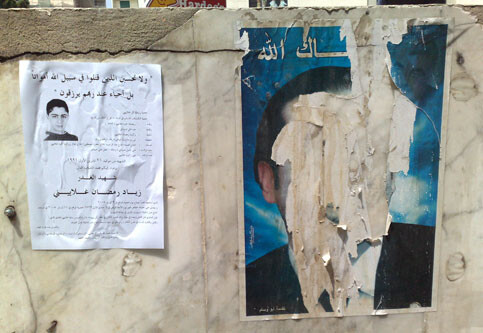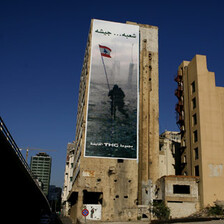Electronic Lebanon Beirut 11 May 2008

A poster honoring a youth killed during clashes in Hamra hangs next to a defaced poster of March 14 coalition leader and parliamentary leader Saad Hariri, 11 May 2008. (Maureen Clare Murphy)
10 May 2008
This is what I have to say about the latest series of political speeches in Lebanon: Hizballah leader Hassan Nasrallah speaks as if there is no future, but March 14 government coalition leaders Walid Jumblat, Saad Hariri and Fouad Siniora speak as if there is no past. For Nasrallah, the past performance and actions of the Loyalists is the only reference point. The past (?) collusion of some of them with Israel, their current alliance with the US and the intersection of some of their positions with the Israeli agenda, as well as the incapability of the Lebanese state to liberate the south and to protect the resistance appear to be the only unit of measure.
On the other hand, the trio Jumblat-Hariri-Siniora has been delivering speeches and addresses as if the past did not exist, as if the resistance was not under threat of physical elimination by the Loyalists’ very allies, as if members of the Loyalists had not destroyed Beirut many times and invited and supported the Israelis when they invaded it, as if there had not been a number of youth killed by the thugs of the Future Movement in Beirut’s Tariq al-Jadide and Ard Jalloul, as if there was no Future Movement militia in Beirut brought from the north (seen by many on TV and in the streets before the fighting) or Progressive Socialist Party (Jumblat) militia (which has murdered Druze political opponents in the mountains), and as if the state was all powerful, belonged to all its citizens, and capable of extending its authority onto the four corners of the country and to fend off Israeli agendas. When you start so far away from each other, the next stop is Xanadu, as my friend Anna would say. The first thing these guys should do is get into the same time zone. This is if they want to find a way out.
Prime Minister Siniora gave a speech today from the Grand Serail. Besides the attacks and refutations of Nasrallah’s rhetoric, he made the following offer: the fate of the contentious decrees (which, he said, have not come into effect) is to be decided by the army; all armed presence is to be removed from the streets; the sit in and the strike are to be lifted and the airport re-opened, a new president is elected (I assume he meant army general Suleiman, but he didn’t say that) following which a national unity government is created in which neither the parliamentary majority nor the opposition have veto power, and the new government will prepare for elections on the basis of the qada (district), with minor “demographic” (read sectarian) adjustment. He added that this offer can form a basis on which one can build to get to a compromise. I think so too.
Moments later, the army responded by taking positive steps and reinstating the airport chief of security. The opposition accepted to remove all armed presence, but promised to keep the “civil disobedience” going. En passant, it reminded Siniora that the decrees are as effective as can be, as they have been sent to the UN for support in implementation.
In West Beirut, and for a reason I cannot fathom, sand barricades have been erected, blocking traffic in almost all the main streets.
Rami Zurayk is a researcher and a writer on food, environment and development issues. He lives in Beirut. His blog is at: http://www.landandpeople.blogspot.com/.



